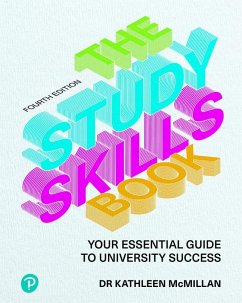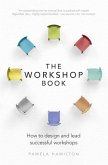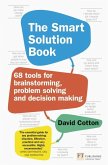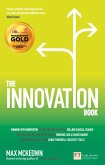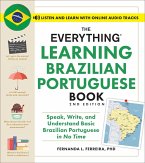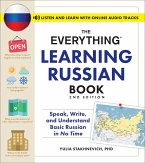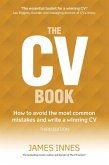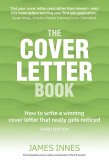22,99 €
inkl. MwSt.
Versandfertig in 2-4 Wochen

11 °P sammeln
- Broschiertes Buch
- Merkliste
- Auf die Merkliste
- Bewerten Bewerten
- Teilen
- Produkt teilen
- Produkterinnerung
- Produkterinnerung
The Study Skills Book is an indispensable resource for university students at any level or ability who want to build confidence, improve performance, and succeed in their studies and beyondGǪ Clear and comprehensive, it covers all types of academic writing, independent learning, research, revision and exam sitting. Using tried and tested tools and techniques to help students find an individual learning style that works best for their needs, this book is every studentGÇÖs essential guide to the evolving university.
Andere Kunden interessierten sich auch für
![Workshop Book, The Workshop Book, The]() Pamela HamiltonWorkshop Book, The22,99 €
Pamela HamiltonWorkshop Book, The22,99 €![Smart Solution Book, The Smart Solution Book, The]() David CottonSmart Solution Book, The22,99 €
David CottonSmart Solution Book, The22,99 €![Innovation Book, The (Book) Innovation Book, The (Book)]() Max MckeownInnovation Book, The (Book)20,99 €
Max MckeownInnovation Book, The (Book)20,99 €![The Everything Learning Brazilian Portuguese Book, 2nd Edition The Everything Learning Brazilian Portuguese Book, 2nd Edition]() Ferreira, Fernanda, PhDThe Everything Learning Brazilian Portuguese Book, 2nd Edition18,99 €
Ferreira, Fernanda, PhDThe Everything Learning Brazilian Portuguese Book, 2nd Edition18,99 €![The Everything Learning Russian Book, 2nd Edition The Everything Learning Russian Book, 2nd Edition]() Yulia StakhnevichThe Everything Learning Russian Book, 2nd Edition18,99 €
Yulia StakhnevichThe Everything Learning Russian Book, 2nd Edition18,99 €![CV Book, The CV Book, The]() James InnesCV Book, The14,99 €
James InnesCV Book, The14,99 €![Cover Letter Book, The Cover Letter Book, The]() James InnesCover Letter Book, The16,99 €
James InnesCover Letter Book, The16,99 €-
-
-
The Study Skills Book is an indispensable resource for university students at any level or ability who want to build confidence, improve performance, and succeed in their studies and beyondGǪ Clear and comprehensive, it covers all types of academic writing, independent learning, research, revision and exam sitting. Using tried and tested tools and techniques to help students find an individual learning style that works best for their needs, this book is every studentGÇÖs essential guide to the evolving university.
Hinweis: Dieser Artikel kann nur an eine deutsche Lieferadresse ausgeliefert werden.
Hinweis: Dieser Artikel kann nur an eine deutsche Lieferadresse ausgeliefert werden.
Produktdetails
- Produktdetails
- Verlag: Pearson Education Limited
- 4 ed
- Seitenzahl: 472
- Erscheinungstermin: 20. Juli 2021
- Englisch
- Abmessung: 227mm x 185mm x 27mm
- Gewicht: 856g
- ISBN-13: 9781292373966
- ISBN-10: 1292373962
- Artikelnr.: 60718700
- Herstellerkennzeichnung
- Libri GmbH
- Europaallee 1
- 36244 Bad Hersfeld
- gpsr@libri.de
- Verlag: Pearson Education Limited
- 4 ed
- Seitenzahl: 472
- Erscheinungstermin: 20. Juli 2021
- Englisch
- Abmessung: 227mm x 185mm x 27mm
- Gewicht: 856g
- ISBN-13: 9781292373966
- ISBN-10: 1292373962
- Artikelnr.: 60718700
- Herstellerkennzeichnung
- Libri GmbH
- Europaallee 1
- 36244 Bad Hersfeld
- gpsr@libri.de
Dr Kathleen McMillan is an academic and educator who has taught at all university levels. Firstly, as a lecturer she designed and delivered courses in European politics. From her experience as an assessor and examiner she identified students’ difficulties in acquiring deeper understanding of their subject and translating that into successful attainment. This awareness led to further research into language acquisition as a foundation of learning and study. Consequently, she led a university team providing learning and language support to UK and international students at all levels. She designed and taught bespoke skills courses in diverse disciplines, such as, accountancy, architecture, art and design, computing science, dentistry, education, engineering, humanities, law, medicine, nursing, and social work. This unique academic experience provides her with insights into the demands of core study and learning skills within the developing learning environment of universities. As author of The Study Skills Book 4th Edition, she presents students at all levels with techniques and approaches that will help them to demonstrate their learning and so achieve success.
INTRODUCTION
1. How to use this book
2. What university involves
PART 1: CARING FOR YOURSELF
Adapting to university life
3. Money matters - tips for university
4. Time management
5. Well-being, stress and mental health
PART 2: DEVELOPING CORE UNIVERSITY STUDY SKILLS
Learning for university
6. Studying for yourself
7. Understanding learning and thinking
8. Digital and blended learning
Learning from listening
9. Active listening for lectures
10. Modern and traditional lectures
Learning from source material
11. Successful academic reading
12. The library as a resource
Learning to develop your understanding
13. Analysing and evaluating information
14. Notes for study purposes
15. Thinking critically
16. Reflective skills
Learning with others
17. Cooperative learning
18. Tutorials
19. Participating in a team
20. Laboratory sessions and field visits
Learning from data
21. Interpreting and presenting data
PART 3: DEVELOPING ACADEMIC WRITING
Preparing for writing
22. Tackling writing assignments
23. Academic writing format
24. Planning writing assignments
Adopting an academic style
25. Academic writing style
26. Shaping your text
27. Citing and referencing
28. Plagiarism
Presenting written work
29. Reviewing, editing and proofreading
30. Presentation of assignments
PART 4: PERFORMING WELL IN COURSE ASSIGNMENTS
Understanding assessment methods
31. Assessment at university
32. Multiple-choices and short-answer questions
33. Numerical questions
34. Essay-style assessments
35. Tutorial assessment
36. Assessments of practical laboratory work
Tackling research-based assessments
37. Choosing a dissertation or research topic
38. Tackling a dissertation or project
39. Ethics in researching and reporting
Presenting research results
40. Report writing
41. Literature reviews
42. Poster presentations
43. Spoken presentation
44. Learning from assessment feedback
PART 5: SUCCEEDING IN EXAMS
Preparing for exams
45. Priming yourself for exams
46. Creating a revision timetable
47. Revision tips
48. Memory tips and techniques
49. Directing your revision
50. Study partnership
Tackling exams
51. Exam-day strategies
52. Doing your best in exams
53. Exam stress
PART 6: PLANNING FOR THE FUTURE
Thinking about 'graduateness'
54. Reviewing your graduate skills and attributes
55. Planning for a career
PART 7: QUICK REFERENCE
Essential writing skills
56. Refreshing your grammar
57. Refreshing your punctuation and spelling
58. Enriching your vocabulary
Essential numerical skills
59. Refreshing number work
60. Refreshing core Maths
Appendix: Student resources
References and further reading
Index
1. How to use this book
2. What university involves
PART 1: CARING FOR YOURSELF
Adapting to university life
3. Money matters - tips for university
4. Time management
5. Well-being, stress and mental health
PART 2: DEVELOPING CORE UNIVERSITY STUDY SKILLS
Learning for university
6. Studying for yourself
7. Understanding learning and thinking
8. Digital and blended learning
Learning from listening
9. Active listening for lectures
10. Modern and traditional lectures
Learning from source material
11. Successful academic reading
12. The library as a resource
Learning to develop your understanding
13. Analysing and evaluating information
14. Notes for study purposes
15. Thinking critically
16. Reflective skills
Learning with others
17. Cooperative learning
18. Tutorials
19. Participating in a team
20. Laboratory sessions and field visits
Learning from data
21. Interpreting and presenting data
PART 3: DEVELOPING ACADEMIC WRITING
Preparing for writing
22. Tackling writing assignments
23. Academic writing format
24. Planning writing assignments
Adopting an academic style
25. Academic writing style
26. Shaping your text
27. Citing and referencing
28. Plagiarism
Presenting written work
29. Reviewing, editing and proofreading
30. Presentation of assignments
PART 4: PERFORMING WELL IN COURSE ASSIGNMENTS
Understanding assessment methods
31. Assessment at university
32. Multiple-choices and short-answer questions
33. Numerical questions
34. Essay-style assessments
35. Tutorial assessment
36. Assessments of practical laboratory work
Tackling research-based assessments
37. Choosing a dissertation or research topic
38. Tackling a dissertation or project
39. Ethics in researching and reporting
Presenting research results
40. Report writing
41. Literature reviews
42. Poster presentations
43. Spoken presentation
44. Learning from assessment feedback
PART 5: SUCCEEDING IN EXAMS
Preparing for exams
45. Priming yourself for exams
46. Creating a revision timetable
47. Revision tips
48. Memory tips and techniques
49. Directing your revision
50. Study partnership
Tackling exams
51. Exam-day strategies
52. Doing your best in exams
53. Exam stress
PART 6: PLANNING FOR THE FUTURE
Thinking about 'graduateness'
54. Reviewing your graduate skills and attributes
55. Planning for a career
PART 7: QUICK REFERENCE
Essential writing skills
56. Refreshing your grammar
57. Refreshing your punctuation and spelling
58. Enriching your vocabulary
Essential numerical skills
59. Refreshing number work
60. Refreshing core Maths
Appendix: Student resources
References and further reading
Index
INTRODUCTION
1. How to use this book
2. What university involves
PART 1: CARING FOR YOURSELF
Adapting to university life
3. Money matters - tips for university
4. Time management
5. Well-being, stress and mental health
PART 2: DEVELOPING CORE UNIVERSITY STUDY SKILLS
Learning for university
6. Studying for yourself
7. Understanding learning and thinking
8. Digital and blended learning
Learning from listening
9. Active listening for lectures
10. Modern and traditional lectures
Learning from source material
11. Successful academic reading
12. The library as a resource
Learning to develop your understanding
13. Analysing and evaluating information
14. Notes for study purposes
15. Thinking critically
16. Reflective skills
Learning with others
17. Cooperative learning
18. Tutorials
19. Participating in a team
20. Laboratory sessions and field visits
Learning from data
21. Interpreting and presenting data
PART 3: DEVELOPING ACADEMIC WRITING
Preparing for writing
22. Tackling writing assignments
23. Academic writing format
24. Planning writing assignments
Adopting an academic style
25. Academic writing style
26. Shaping your text
27. Citing and referencing
28. Plagiarism
Presenting written work
29. Reviewing, editing and proofreading
30. Presentation of assignments
PART 4: PERFORMING WELL IN COURSE ASSIGNMENTS
Understanding assessment methods
31. Assessment at university
32. Multiple-choices and short-answer questions
33. Numerical questions
34. Essay-style assessments
35. Tutorial assessment
36. Assessments of practical laboratory work
Tackling research-based assessments
37. Choosing a dissertation or research topic
38. Tackling a dissertation or project
39. Ethics in researching and reporting
Presenting research results
40. Report writing
41. Literature reviews
42. Poster presentations
43. Spoken presentation
44. Learning from assessment feedback
PART 5: SUCCEEDING IN EXAMS
Preparing for exams
45. Priming yourself for exams
46. Creating a revision timetable
47. Revision tips
48. Memory tips and techniques
49. Directing your revision
50. Study partnership
Tackling exams
51. Exam-day strategies
52. Doing your best in exams
53. Exam stress
PART 6: PLANNING FOR THE FUTURE
Thinking about 'graduateness'
54. Reviewing your graduate skills and attributes
55. Planning for a career
PART 7: QUICK REFERENCE
Essential writing skills
56. Refreshing your grammar
57. Refreshing your punctuation and spelling
58. Enriching your vocabulary
Essential numerical skills
59. Refreshing number work
60. Refreshing core Maths
Appendix: Student resources
References and further reading
Index
1. How to use this book
2. What university involves
PART 1: CARING FOR YOURSELF
Adapting to university life
3. Money matters - tips for university
4. Time management
5. Well-being, stress and mental health
PART 2: DEVELOPING CORE UNIVERSITY STUDY SKILLS
Learning for university
6. Studying for yourself
7. Understanding learning and thinking
8. Digital and blended learning
Learning from listening
9. Active listening for lectures
10. Modern and traditional lectures
Learning from source material
11. Successful academic reading
12. The library as a resource
Learning to develop your understanding
13. Analysing and evaluating information
14. Notes for study purposes
15. Thinking critically
16. Reflective skills
Learning with others
17. Cooperative learning
18. Tutorials
19. Participating in a team
20. Laboratory sessions and field visits
Learning from data
21. Interpreting and presenting data
PART 3: DEVELOPING ACADEMIC WRITING
Preparing for writing
22. Tackling writing assignments
23. Academic writing format
24. Planning writing assignments
Adopting an academic style
25. Academic writing style
26. Shaping your text
27. Citing and referencing
28. Plagiarism
Presenting written work
29. Reviewing, editing and proofreading
30. Presentation of assignments
PART 4: PERFORMING WELL IN COURSE ASSIGNMENTS
Understanding assessment methods
31. Assessment at university
32. Multiple-choices and short-answer questions
33. Numerical questions
34. Essay-style assessments
35. Tutorial assessment
36. Assessments of practical laboratory work
Tackling research-based assessments
37. Choosing a dissertation or research topic
38. Tackling a dissertation or project
39. Ethics in researching and reporting
Presenting research results
40. Report writing
41. Literature reviews
42. Poster presentations
43. Spoken presentation
44. Learning from assessment feedback
PART 5: SUCCEEDING IN EXAMS
Preparing for exams
45. Priming yourself for exams
46. Creating a revision timetable
47. Revision tips
48. Memory tips and techniques
49. Directing your revision
50. Study partnership
Tackling exams
51. Exam-day strategies
52. Doing your best in exams
53. Exam stress
PART 6: PLANNING FOR THE FUTURE
Thinking about 'graduateness'
54. Reviewing your graduate skills and attributes
55. Planning for a career
PART 7: QUICK REFERENCE
Essential writing skills
56. Refreshing your grammar
57. Refreshing your punctuation and spelling
58. Enriching your vocabulary
Essential numerical skills
59. Refreshing number work
60. Refreshing core Maths
Appendix: Student resources
References and further reading
Index
